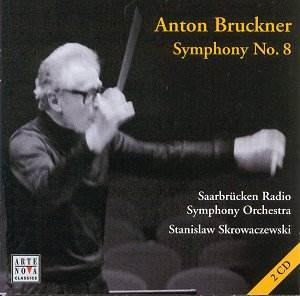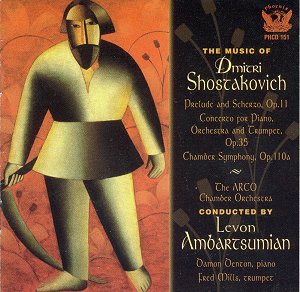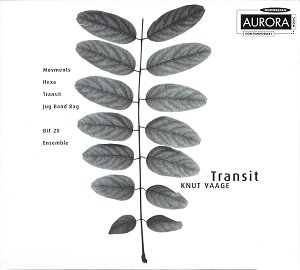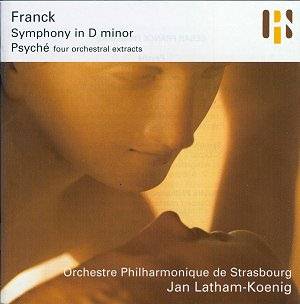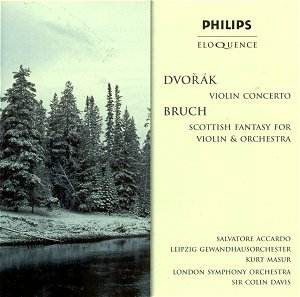 Composer: Antonín Dvořák
Composer: Antonín Dvořák
Works: Violin Concerto, Op. 53; Scottish Fantasy, Op. 46
Performers: Salvatore Accardo, violin; Concertgebouw Orchestra; Colin Davis, conductor; Gewandhausorchester Leipzig; Kurt Masur, conductor
Recording: Dvořák recorded 1978; Bruch recorded 1980
Label: Eloquence, Philips 468 308-2
Antonín Dvořák’s Violin Concerto, composed in 1879, emerges from a rich tapestry of folk influence and virtuosic display, marrying lyrical beauty with technical demands. This work, often overshadowed by the more popular concertos of the 19th century, showcases Dvořák’s unique voice and his ability to integrate Slavic folk traditions into a Western classical framework. Coupled with Max Bruch’s Scottish Fantasy, a work steeped in the evocative sounds of the Highlands, this recording offers a nuanced exploration of two composers whose works resonate with the colors of their respective cultures.
Salvatore Accardo’s interpretation of the Dvořák Concerto reveals a violinistic sensibility that balances expressiveness with restraint. His tone is both pliable and compelling, allowing the lyrical lines to unfold naturally. In the first movement, Accardo exhibits superb control of dynamics, particularly in the dialogue with the woodwinds, where the flute’s shadowing of the violin creates a moment of interplay that is both tender and reflective. The Concertgebouw Orchestra, under Colin Davis, complements this with a rich palette of sound colors, emphasizing the chamber-like qualities of Dvořák’s orchestration. The principals of the orchestra exhibit an impressive command of the score, turning the fabric of the music into a vibrant conversation among instruments, echoing the work’s folk roots.
The second movement’s songful melodies are treated with a delicate touch, where Accardo’s effortless trills and lyrical phrases weave a tapestry of emotion that is both intimate and profound. Davis’s conducting, characterized by a generous yet attentive approach, allows for a natural flow that captures the folk-like dance rhythms emerging in the brass-led sections. While Accardo’s phrasing is rhythmically pointed, the finale lacks the visceral drive found in some other notable recordings, such as that of Josef Suk, whose interpretation brims with an adrenaline-infused spirit that elevates the work to exhilarating heights. However, this does not detract from the artistry displayed; Accardo’s nuanced handling of the material invites listeners into a reflective space, albeit with a slightly more subdued energy.
Turning to Bruch’s Scottish Fantasy, Accardo’s performance alongside Kurt Masur and the Gewandhausorchester is equally compelling. Masur’s background as a string player informs his conducting, bringing an exquisite clarity and richness to the orchestration. The strings’ lush sonorities in the first movement set a warm atmosphere, and Accardo’s violin weaves in and out of the orchestral fabric with grace. The Scherzo is particularly noteworthy for its vibrant exchanges between the violin and woodwinds, where the excitement is palpable. The transition from the Adagio to the Andante sostenuto showcases both the soloist’s technical prowess and the orchestra’s ability to support and enhance the solo line without overpowering it. Accardo’s phrasing is imbued with a lyrical grace that transforms the interplay into a captivating dialogue.
The recording quality across both works is commendably clear, with a balanced soundstage that captures the nuances of each instrument. The engineering ensures that the listener can appreciate the subtleties of Accardo’s performance, from the delicate shading in the slow movements to the spirited exchanges in the faster sections. Eloquence’s remastering of these historic performances breathes new life into them, allowing modern audiences to engage with the vitality of these interpretations.
Accardo’s readings of both Dvořák and Bruch present a rewarding experience, marked by a deep understanding of the material and a commitment to expressive clarity. While there are aspects—especially in the Dvořák finale—that may leave some listeners yearning for the exuberance found in other renditions, the overall artistry and the thoughtful partnership with the orchestras create a significant listening experience. This disc is noteworthy not only for its historical context but also for the way it illuminates the enduring beauty of these works, making it a valuable addition to any collection. The Bruch, in particular, stands out as a memorable interpretation that warrants repeated listening.
